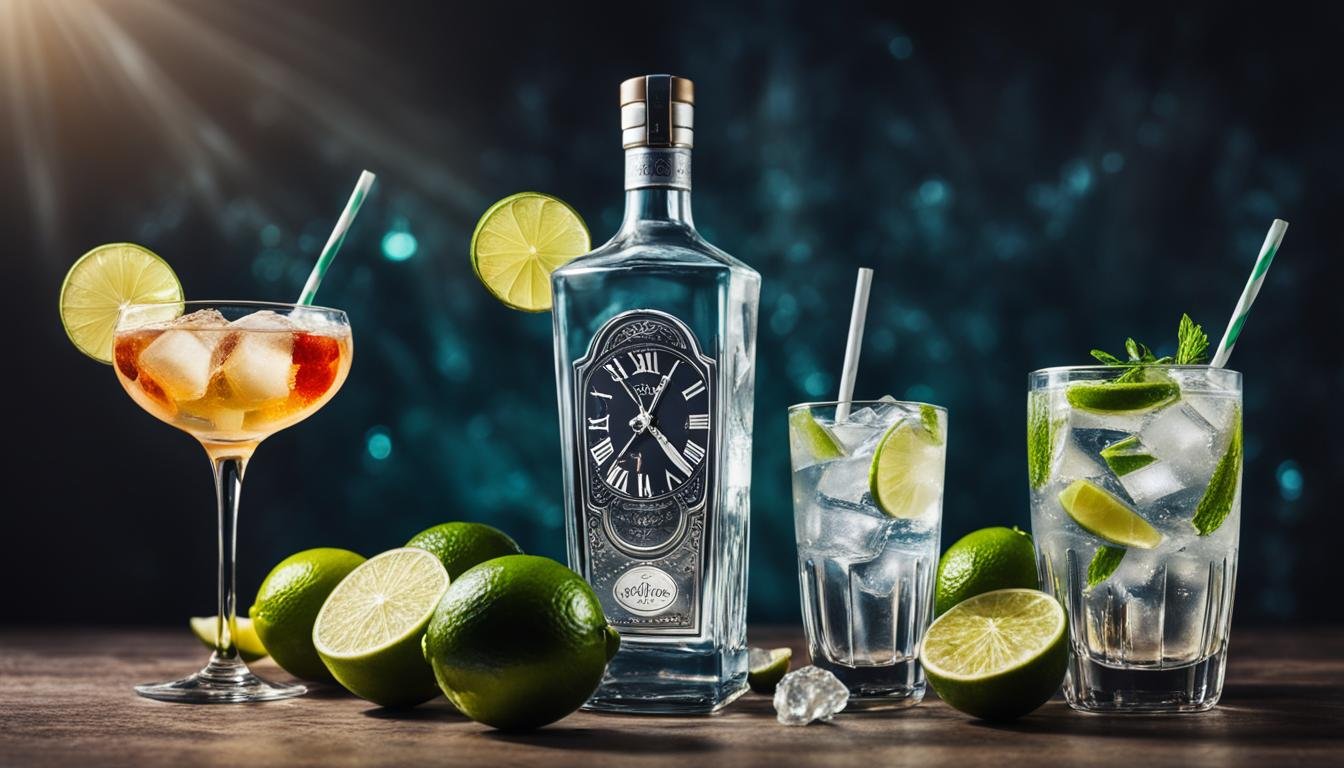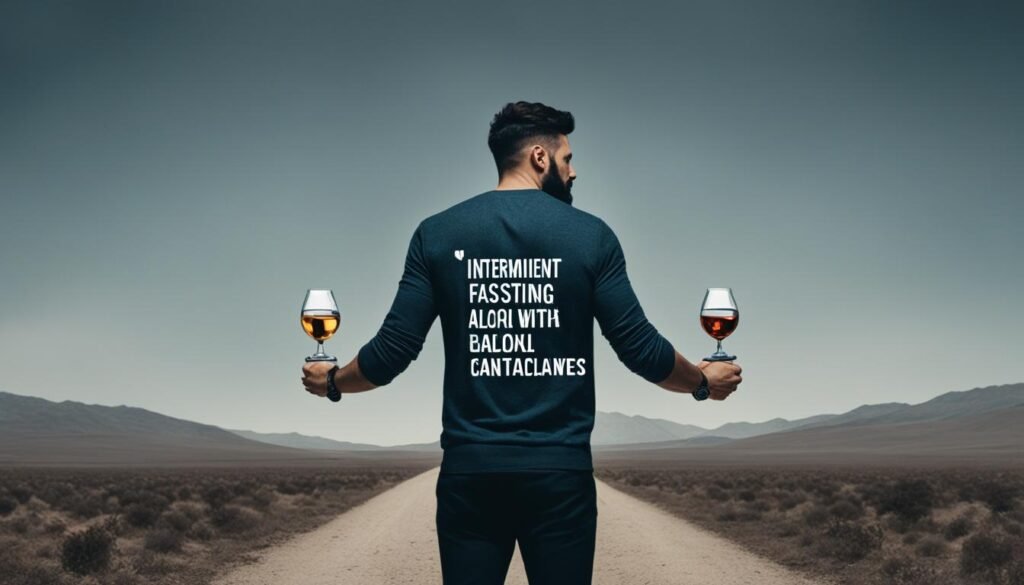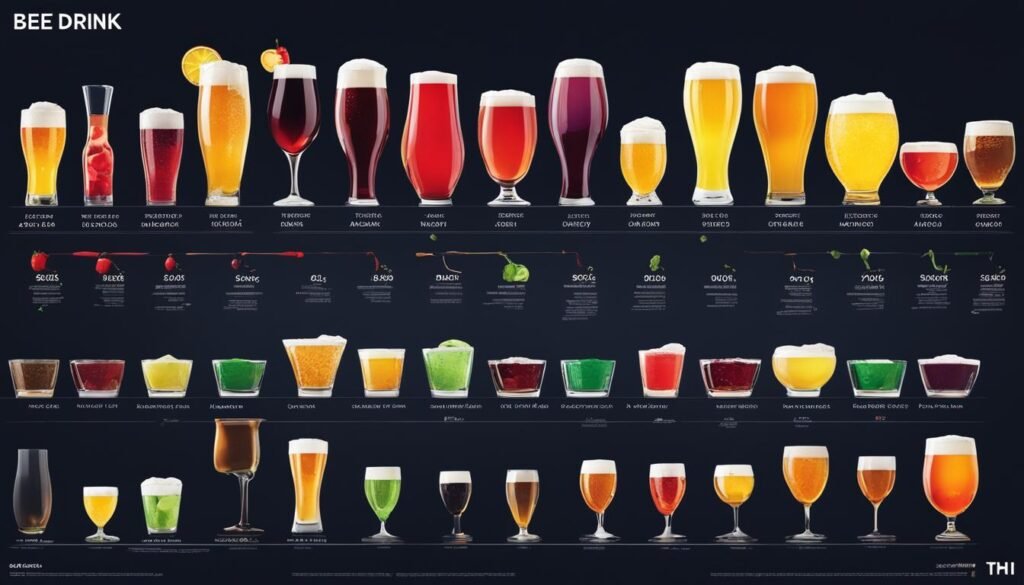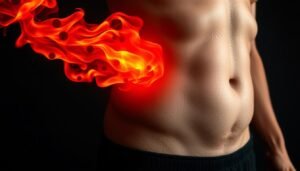Get our FREE E-Book HERE - 120 TIPS for Losing Weight & Bonus Tips for Postpartum Weight Loss & Dad’s Postpartum Experience
Best Alcohol for Intermittent Fasting Choices

Welcome to our guide on the best alcohol choices for intermittent fasting. If you’re following an intermittent fasting plan, you may be wondering if it’s possible to enjoy a drink while still staying on track with your fasting goals. We understand that striking a balance between your social life and your health goals is important. In this article, we will explore the best alcohol for intermittent fasting options that complement your fasting plan, so you can make informed choices and enjoy a drink without derailing your progress. Let’s dive in!
Key Takeaways:
- The best alcohol for Intermittent Fasting is relevant to your intermittent fasting goals.
- Low-calorie alcoholic beverages are a great option for intermittent fasting.
- Timing and moderation are crucial when incorporating alcohol into your eating window.
- Tracking your alcohol intake using nutrition apps can help maintain calorie control.
- Avoiding certain alcohol types can minimize negative effects on fasting goals.
Understanding Intermittent Fasting and Alcohol Consumption
In this section, we will delve into the relationship between intermittent fasting and alcohol consumption. We will explore the dynamics between intermittent fasting and alcohol, answer the question of whether alcohol breaks a fast, and examine the impact of alcohol on intermittent fasting goals.
Aligning Your Intermittent Fasting Plan with Alcohol Intake
Integrating alcohol into your intermittent fasting plan requires careful consideration. While alcohol consumption can be a part of your eating window, it’s essential to understand how to include it without hindering your progress. In this section, we will discuss strategies for incorporating alcohol into your intermittent fasting routine while maintaining your fasting goals.
How to Include Alcohol in Your Eating Window Without Hindering Progress
When including alcohol in your eating window during intermittent fasting, moderation is key. Here are a few tips to help you include alcohol and choose the Best Alcohol for Intermittent Fasting without derailing your progress:
- Choose low-calorie alcoholic beverages: Opt for options such as light beer, dry wine, or spirits with low sugar content to minimize calorie intake.
- Avoid sugary mixers: Mix alcohol with calorie-free or low-calorie options like soda water, sparkling water, or diet soda to reduce overall calorie consumption.
- Consider intermittent fasting-friendly cocktails: Explore recipes that use ingredients like fresh herbs, citrus, or natural sweeteners instead of sugary syrups.
Moderation and Timing: Key Factors for Intermittent Fasting Drinkers
When it comes to the best alcohol for intermittent fasting, timing is crucial. Here are some considerations to keep in mind:
- Plan your drinking window: Align your alcohol consumption with your eating window to ensure it falls within the designated hours of your intermittent fasting plan.
- Moderate your alcohol intake: Limit the amount of alcohol you consume to avoid excessive calorie intake and potential disruptions to your fasting goals.
- Avoid binge drinking: Excessive alcohol consumption can lead to overeating and compromise the benefits of intermittent fasting. Practice moderation and mindful drinking.

How Alcohol Affects Intermittent Fasting Benefits
Alcohol consumption can have both short-term and long-term effects on the benefits of intermittent fasting. When incorporating alcohol into an intermittent fasting plan, it is important to understand how it can impact weight loss, fat burning, inflammation, and other potential benefits.
While occasional alcohol consumption may not completely derail your fasting goals, it is essential to be aware of the potential drawbacks. To make informed decisions about alcohol consumption during intermittent fasting, it is crucial to understand the various effects it can have on your body.
“Alcohol has the potential to interfere with the benefits of intermittent fasting. It can affect your metabolism, disrupt fat burning, and hinder weight loss progress.”
One of the primary concerns is that alcohol contains calories, and consuming it can break your fast by elevating blood sugar levels. This can inhibit fat burning and impact the overall calorie deficit that plays a crucial role in weight loss.
Additionally, alcohol can stimulate the release of insulin, which may interrupt the fasting state and alter the body’s ability to burn stored fat. It can also lead to increased cravings, making it more challenging to maintain a healthy eating pattern during your fasting window.
Moreover, excessive alcohol consumption can result in dehydration, electrolyte imbalances, and nutritional deficiencies. These factors can affect your overall well-being and potentially hinder the benefits that intermittent fasting offers.
By understanding the effects of alcohol on intermittent fasting, you can make more informed choices about your alcohol intake. Remember that moderation is key, and it is crucial to prioritize your fasting goals while incorporating alcohol into your eating window.
Effects of Alcohol on Intermittent Fasting Benefits:
| Effects | Impact on Intermittent Fasting Benefits |
|---|---|
| Disrupts fat burning | May hinder weight loss progress |
| Elevates blood sugar levels | Can break the fast and inhibit fat burning |
| Stimulates insulin release | May interrupt the fasting state and impact metabolism |
| Increases cravings | Makes it harder to maintain a healthy eating pattern |
| Dehydration and electrolyte imbalances | Can negatively affect overall well-being |
Understanding these effects will empower you to make mindful choices regarding alcohol consumption during intermittent fasting. It is essential to strike a balance that aligns with your fasting goals and overall well-being.
The Caloric Content and Effects of Different Alcoholic Beverages
Different types of alcoholic beverages have varying caloric content and can have different effects on weight loss and fasting goals. If you are practicing intermittent fasting, it’s important to choose the most appropriate alcoholic beverages to support your health objectives. Let’s explore the caloric content and effects of popular alcoholic beverages, including wine, beer, spirits, and mixed drinks.
1. Wine:
Wine is a common alcoholic choice, and its caloric content can vary based on the type and serving size. On average, a glass of red or white wine contains around 120-150 calories. However, it’s important to note that sweet or fortified wines may have a higher caloric content. While wine can be enjoyed in moderation during intermittent fasting, it’s essential to consider the calorie impact.
2. Beer:
Beer enthusiasts should be mindful of its caloric content. A regular 12-ounce beer typically contains around 150-200 calories. Light beers offer a lower-calorie option, usually ranging from 90-120 calories per 12-ounce serving. If you choose to drink beer during fasting, opt for light varieties to manage your calorie intake more effectively.
3. Spirits:
Spirits like vodka, whiskey, and rum are often consumed in the form of cocktails. These distilled spirits have a higher alcohol content and a relatively lower caloric value compared to wine or beer. On average, a 1.5-ounce serving of distilled spirits contains around 100-120 calories. When enjoying spirits during intermittent fasting, it’s important to be cautious of the calorie-dense mixers often used in cocktails.
4. Mixed Drinks:
Mixed drinks, such as margaritas, martinis, and mojitos, can be a flavorful choice but tend to have higher caloric content due to the addition of sugary mixers and syrups. The caloric value of mixed drinks can vary significantly based on the ingredients used and the serving size. It’s crucial to be mindful of the added calories and consider opting for lighter, lower-calorie versions when possible.

Understanding the caloric content of different alcoholic beverages can help you make informed choices and manage your calorie intake during intermittent fasting. Remember, moderation is key, and it’s essential to consider the overall impact of alcohol on your fasting goals and weight loss journey.
Best Alcohol for Intermittent Fasting
Not all alcoholic beverages are equally compatible with intermittent fasting. In this section, we will highlight the best alcohol choices for those following an intermittent fasting plan. We will discuss low-calorie alcoholic beverages that are compatible with IF and recommend specific alcohol choices for optimal results. Additionally, we will identify alcohol types to avoid during intermittent fasting to minimize any negative effects on fasting goals.
Low-Calorie Alcoholic Beverages Compatible with IF
When it comes to intermittent fasting, choosing low-calorie alcoholic beverages can help you maintain your fasting goals. Light beers, dry wines, and spirits mixed with water or diet soda are excellent choices.
Recommended Alcoholic Choices for Optimal IF Results
If you are looking for specific alcohol options that align well with intermittent fasting, here are some recommendations:
- Light beers such as Corona Light or Michelob Ultra
- Dry wines like Pinot Grigio or Sauvignon Blanc
- Clear spirits such as vodka or tequila mixed with sparkling water and a splash of lime juice
These options are lower in calories and contain fewer carbohydrates, making them suitable for intermittent fasting.
Alcohol Types to Avoid During Intermittent Fasting
While certain alcoholic beverages are compatible with intermittent fasting, there are others that should be avoided as they may hinder your fasting goals. It is best to steer clear of high-calorie cocktails, sweet wines, and sugary mixed drinks that can spike your blood sugar levels and break your fast. Also, be cautious of beers with a high alcohol content, as they tend to be higher in calories.
Conclusion
In conclusion, alcohol can play a role in intermittent fasting, but it’s important to make informed choices to avoid hindering your fasting goals. Throughout this article, we explored the dynamics between alcohol and intermittent fasting, discussing how alcohol consumption can affect fasting results.
While alcohol does have calories and can break a fast, it is possible to include it in your eating window without sabotaging your progress. Moderation and timing are key factors to consider when consuming alcohol during intermittent fasting. By practicing moderation and choosing low-calorie alcoholic beverages, you can still enjoy an occasional drink while staying on track.
When incorporating alcohol into your intermittent fasting plan, it’s essential to track your calorie intake. Utilizing nutrition apps can help you keep an eye on your alcohol consumption and ensure that it aligns with your fasting goals. Remember, knowledge and self-discipline are crucial in maintaining a healthy and effective intermittent fasting routine.
In summary, alcohol should be consumed with caution during intermittent fasting, taking into account its impact on calorie intake and fasting benefits. It’s recommended to opt for low-calorie alcoholic beverages and avoid types of alcohol that are high in sugar or have significant calorie content. By making mindful choices, you can navigate the relationship between alcohol and intermittent fasting successfully.








